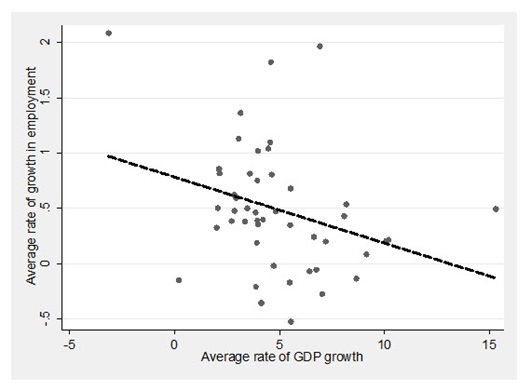Claude Forthomme's Blog, page 19
August 5, 2015
The Rhythms of Life: an Interview with Francine Kaufman, MD
Dr. Francine Kaufman, chief medical officer and vice president of Global Diabetes for Medtronic, Inc since 2009, and previously head of the Center for Endocrinology, Diabetes and Metabolism at Children's Hospital Los Angeles, is perhaps best known for her critically-acclaimed nonfiction book Diabesity: The Obesity-Diabetes Epidemic That Threatens America - And What We Must Do to Stop It (Bantam, 2005, available on Amazon here). She also has a long list of more technical writing as well, books and more 200 peer-reviewed publications.
But 2015 has proved to be a turning point for her with the publication of her first novel, Rythms. Here is the enticing cover that artfully reflects the theme of the book:
 Available on Amazon in digital and printed version, click here
Available on Amazon in digital and printed version, click here
(Published by Charm Kraft Ind, California)
Since it is a novel that features a woman physician grappling with the last, harrowing three days in her mother's life (she is suffering from arrythmia), I was immediately struck by the implications, both for Dr. Kaufman who seems to have fictionalized a major event in her life and for myself, since I lost my own mother a few months ago (she was 101 and also suffered from arrythmia - I recounted her passing with a poem "The First Days of My Life Without You", published on this blog here).
The opening paragraph immediately grabbed me:

This is a remarkable first chapter, the author throws her reader in media res, you can see the woman grappling with the issues right away. And I am very pleased to share with you this interview with author Francine Kaufman.
Q: The book description on Amazon is terse and direct: "A novel about a woman physician and the last three days of her mother's life". Could you tell us what the book is about in your own words?
Dr. Francine Kaufman: Rhythms is a family drama centered around the death of the protagonist’s elderly, frail mother. It takes place over three days, but toggles back and forth in time to introduce the reader to the characters and their lives. The three days in the present show how all-consuming caring for an elderly parent can be - particularly when that parent resides in your home.
Q: What motivated you to write it?
Dr. Kaufman: I was motivated by the power of families keeping secrets. I was also moved to write to come to terms with the death of my own mother. I did care for my own mother when she was dying in my home. There were times it was very hard. I tried to reveal the fear, disgust, and rawness of realizing that you have become your mother's mother. I also tried to show how this intermingles with the realization that many of us don't really know who all that there is to know about our own mothers. I always felt my mother had secrets and I didn’t know all that happened to her in her life. I know we all have secrets and I explored in my book how this helps share who we are and what can happen in our lives. Q: The book is a skillful blend of medical detail and the personal life of a family. How easy was that for you to do, since this is your first novel after all.
 Dr. Kaufman: As a doctor, I found myself drawn to telling the story through a medical lens. And also that in the life of a doctor who is a mother and wife, there is a lot of multi-tasking. I drew on my own experience for that. The protagonist, Dr. Rebecca Brodie, is a doctor in every cell of her body, excited by research, but driven by the human interactions, the stories she is told by her patients, and the need to play detective to determine what is real from what is not. Her job as a doctor is to find out everything about everyone, but yet I show in my book how she is unable to find out everything about her own family. There’s irony in Rebecca being able to penetrate the facades put in place by her patients, but not by her own family.
Dr. Kaufman: As a doctor, I found myself drawn to telling the story through a medical lens. And also that in the life of a doctor who is a mother and wife, there is a lot of multi-tasking. I drew on my own experience for that. The protagonist, Dr. Rebecca Brodie, is a doctor in every cell of her body, excited by research, but driven by the human interactions, the stories she is told by her patients, and the need to play detective to determine what is real from what is not. Her job as a doctor is to find out everything about everyone, but yet I show in my book how she is unable to find out everything about her own family. There’s irony in Rebecca being able to penetrate the facades put in place by her patients, but not by her own family.
Q: Is this a feminist “having it all” sort of story?
Dr. Kaufman: Rhythms is the story of the woman raised in a time when the world wanted her to believe she could do anything and everything. Only Rebecca could determine for herself at what sacrifice that had to be done - and cope with the angst of never feeling she could do enough. Perhaps it’s a feminist story about an empowered, effective woman who is a doctor and scientist, but it also shows the emotional ties that a woman needs to thrive as a mother and wife.
Thank you, Dr. Kaufman, for sharing these thoughts with us. I can fully empathize with your observation that as a woman "raised in a time when the world wanted her to believe she could do anything and everything" - in this case, juggling three lives, one as a scientist, another as a mother and the third as a daughter caring for her dying parent - must have given her the "angst of never feeling she could do enough."
That angst, I'm afraid, is with all of us working mothers and, more broadly, all of us baby boomers, male and female, having to take care of our aging parents and yet still responsible for our grown-up children - the "sandwiched generation". And that is why Dr. Kaufman's novel is such an important book and I highly recommend it.









But 2015 has proved to be a turning point for her with the publication of her first novel, Rythms. Here is the enticing cover that artfully reflects the theme of the book:
 Available on Amazon in digital and printed version, click here
Available on Amazon in digital and printed version, click here (Published by Charm Kraft Ind, California)
Since it is a novel that features a woman physician grappling with the last, harrowing three days in her mother's life (she is suffering from arrythmia), I was immediately struck by the implications, both for Dr. Kaufman who seems to have fictionalized a major event in her life and for myself, since I lost my own mother a few months ago (she was 101 and also suffered from arrythmia - I recounted her passing with a poem "The First Days of My Life Without You", published on this blog here).
The opening paragraph immediately grabbed me:

This is a remarkable first chapter, the author throws her reader in media res, you can see the woman grappling with the issues right away. And I am very pleased to share with you this interview with author Francine Kaufman.
Q: The book description on Amazon is terse and direct: "A novel about a woman physician and the last three days of her mother's life". Could you tell us what the book is about in your own words?
Dr. Francine Kaufman: Rhythms is a family drama centered around the death of the protagonist’s elderly, frail mother. It takes place over three days, but toggles back and forth in time to introduce the reader to the characters and their lives. The three days in the present show how all-consuming caring for an elderly parent can be - particularly when that parent resides in your home.
Q: What motivated you to write it?
Dr. Kaufman: I was motivated by the power of families keeping secrets. I was also moved to write to come to terms with the death of my own mother. I did care for my own mother when she was dying in my home. There were times it was very hard. I tried to reveal the fear, disgust, and rawness of realizing that you have become your mother's mother. I also tried to show how this intermingles with the realization that many of us don't really know who all that there is to know about our own mothers. I always felt my mother had secrets and I didn’t know all that happened to her in her life. I know we all have secrets and I explored in my book how this helps share who we are and what can happen in our lives. Q: The book is a skillful blend of medical detail and the personal life of a family. How easy was that for you to do, since this is your first novel after all.
 Dr. Kaufman: As a doctor, I found myself drawn to telling the story through a medical lens. And also that in the life of a doctor who is a mother and wife, there is a lot of multi-tasking. I drew on my own experience for that. The protagonist, Dr. Rebecca Brodie, is a doctor in every cell of her body, excited by research, but driven by the human interactions, the stories she is told by her patients, and the need to play detective to determine what is real from what is not. Her job as a doctor is to find out everything about everyone, but yet I show in my book how she is unable to find out everything about her own family. There’s irony in Rebecca being able to penetrate the facades put in place by her patients, but not by her own family.
Dr. Kaufman: As a doctor, I found myself drawn to telling the story through a medical lens. And also that in the life of a doctor who is a mother and wife, there is a lot of multi-tasking. I drew on my own experience for that. The protagonist, Dr. Rebecca Brodie, is a doctor in every cell of her body, excited by research, but driven by the human interactions, the stories she is told by her patients, and the need to play detective to determine what is real from what is not. Her job as a doctor is to find out everything about everyone, but yet I show in my book how she is unable to find out everything about her own family. There’s irony in Rebecca being able to penetrate the facades put in place by her patients, but not by her own family. Q: Is this a feminist “having it all” sort of story?
Dr. Kaufman: Rhythms is the story of the woman raised in a time when the world wanted her to believe she could do anything and everything. Only Rebecca could determine for herself at what sacrifice that had to be done - and cope with the angst of never feeling she could do enough. Perhaps it’s a feminist story about an empowered, effective woman who is a doctor and scientist, but it also shows the emotional ties that a woman needs to thrive as a mother and wife.
Thank you, Dr. Kaufman, for sharing these thoughts with us. I can fully empathize with your observation that as a woman "raised in a time when the world wanted her to believe she could do anything and everything" - in this case, juggling three lives, one as a scientist, another as a mother and the third as a daughter caring for her dying parent - must have given her the "angst of never feeling she could do enough."
That angst, I'm afraid, is with all of us working mothers and, more broadly, all of us baby boomers, male and female, having to take care of our aging parents and yet still responsible for our grown-up children - the "sandwiched generation". And that is why Dr. Kaufman's novel is such an important book and I highly recommend it.









Published on August 05, 2015 03:26
August 3, 2015
What the United Nations Really is: A Battlefield
Every issue that turns up in the news sooner or later ends at the United Nations (if it didn't actually start there). Recent examples? The killing of Cecil the lion and President Obama's decision to tighten fossil fuels regulations.

Regarding the latter, announced over the week-end, Obama appears determined to make of these new regulations the second signature policy of his presidency - the first being of course Obamacare, the extension of health coverage to millions of Americans that didn't have it.
How does all this relate to the UN?
First, Cecil the Lion. In the midst of the scandal raised by Cecil's shameful killing by an American dentist and the announcement that Zimbabwe would ask for his extradition and the US Fish and Wildlife Service would launch an investigation (see here), the United Nations General Assembly adopted on 30 July, the "first ever" resolution on 'tackling illicit trafficking in wildlife' with a high number of co-sponsors, including all European Union member states, the United States, Canada and Australia, among others:
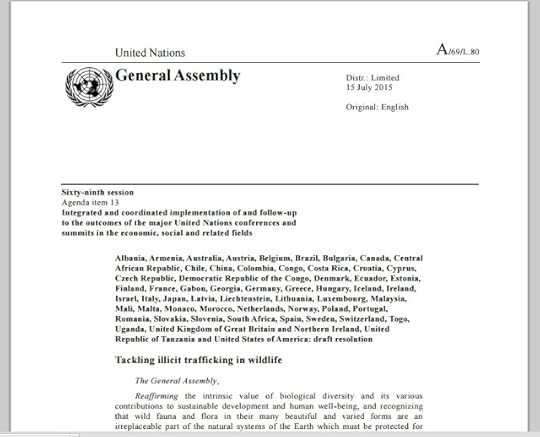 Draft Resolution circulated to the UNGA on 15 July - adopted on 30 July 2015 (screenshot) It shows the list of states sponsoring the ResolutionPlease note that the "wildlife crisis" - and the need to protect biological diversity, a key element and "irreplaceable part of the natural systems of the Earth" - had been an on-going subject of debate at the UN
long before
the Cecil tragedy drew the world's attention to the damage done by Big Hunters. And the push to regulate illicit trafficking in wildlife will now continue
long after
everyone has forgotten about Cecil. Year in, year out, the UN General Assembly is tasked by the Resolution itself to review progress and is in fact expecting concrete proposals from the UN Secretary General next year.
Draft Resolution circulated to the UNGA on 15 July - adopted on 30 July 2015 (screenshot) It shows the list of states sponsoring the ResolutionPlease note that the "wildlife crisis" - and the need to protect biological diversity, a key element and "irreplaceable part of the natural systems of the Earth" - had been an on-going subject of debate at the UN
long before
the Cecil tragedy drew the world's attention to the damage done by Big Hunters. And the push to regulate illicit trafficking in wildlife will now continue
long after
everyone has forgotten about Cecil. Year in, year out, the UN General Assembly is tasked by the Resolution itself to review progress and is in fact expecting concrete proposals from the UN Secretary General next year.
UN staff is working on it along with partners: in 2009, an international consortium of five major agencies (ICCWC) was created to fight wildlife and forest crime:

The United Nations Office on Drugs and Crime (see UNDOC's Annual Report 2014) was asked to take the lead and has a 4-year Global Programme for Combating Wildlife and Forest Crime:

Second, the new set of US environmental regulations. Meant to combat climate change, they are placing the US in the driving seat at the Climate Change Summit (COP 21) to be held in December in Paris. As Obama says in this video, "climate change is not a problem for another generation, not anymore" and he wants to turn the US into a leader in the fight against Climate Change :
That Climate Summit in Paris will surely see much heated debate among the 50,000 participants it is expected to attract, including 25,000 official delegates. A major bone of contention is likely to be, as in the past, demands from developing countries who are attached to the so-called "principle of common but differentiated responsibilities" which establishes that “while all countries are responsible for contributing to sustainable development, countries that have been historically richer have additional responsibilities.’ Additional responsibilities for addressing Climate Change that, of course, they are not willing to accept without a fight.
Conclusion:
Everytime, a major issue affecting humanity is raised, it reaches the UN, turning it into a battlefield.
Why?
Because there are three broad categories of "users" of the UN system - or stakeholders - with different mandates and interests, and within each, there are special interest groups.
Briefly:

These are the players in the UN game. Their interaction - endless debates, numerous resolutions, programmes, development agenda, field projects to demonstrate pilot approaches to sustainable development etc etc - all this, overtime, has a consequence on the international political scene. It adds up to what I would like to call the United Nations' "soft power".
More about that in future posts, as I work on the concept for my upcoming book on the United Nations.
Related Articles about News Where the UN Has Central Role [image error] Developing countries express reservations as UN adopts financing for development agenda [image error] Dictators and Billionaires Demand Creation of UN Tax Agency [image error] India abstains from voting on UN resolution on American NGO [image error] UN rights chief worried by breadth of China security law [image error] Russia Vetoes UN Resolution for Setting Tribunal on MH17 Disaster [image error] Creating Bioprivacy as UN Conference to Publish Nagoya Protocol Handbook [image error] "Wolfowitz Doctrine" Reveals U.S. Govt's #1 Objective (it's NOT peace) [image error] PH files new pleading in UN tribunale
[image error] World Day Against Trafficking in Persons










Regarding the latter, announced over the week-end, Obama appears determined to make of these new regulations the second signature policy of his presidency - the first being of course Obamacare, the extension of health coverage to millions of Americans that didn't have it.
How does all this relate to the UN?
First, Cecil the Lion. In the midst of the scandal raised by Cecil's shameful killing by an American dentist and the announcement that Zimbabwe would ask for his extradition and the US Fish and Wildlife Service would launch an investigation (see here), the United Nations General Assembly adopted on 30 July, the "first ever" resolution on 'tackling illicit trafficking in wildlife' with a high number of co-sponsors, including all European Union member states, the United States, Canada and Australia, among others:
 Draft Resolution circulated to the UNGA on 15 July - adopted on 30 July 2015 (screenshot) It shows the list of states sponsoring the ResolutionPlease note that the "wildlife crisis" - and the need to protect biological diversity, a key element and "irreplaceable part of the natural systems of the Earth" - had been an on-going subject of debate at the UN
long before
the Cecil tragedy drew the world's attention to the damage done by Big Hunters. And the push to regulate illicit trafficking in wildlife will now continue
long after
everyone has forgotten about Cecil. Year in, year out, the UN General Assembly is tasked by the Resolution itself to review progress and is in fact expecting concrete proposals from the UN Secretary General next year.
Draft Resolution circulated to the UNGA on 15 July - adopted on 30 July 2015 (screenshot) It shows the list of states sponsoring the ResolutionPlease note that the "wildlife crisis" - and the need to protect biological diversity, a key element and "irreplaceable part of the natural systems of the Earth" - had been an on-going subject of debate at the UN
long before
the Cecil tragedy drew the world's attention to the damage done by Big Hunters. And the push to regulate illicit trafficking in wildlife will now continue
long after
everyone has forgotten about Cecil. Year in, year out, the UN General Assembly is tasked by the Resolution itself to review progress and is in fact expecting concrete proposals from the UN Secretary General next year.UN staff is working on it along with partners: in 2009, an international consortium of five major agencies (ICCWC) was created to fight wildlife and forest crime:

The United Nations Office on Drugs and Crime (see UNDOC's Annual Report 2014) was asked to take the lead and has a 4-year Global Programme for Combating Wildlife and Forest Crime:

Second, the new set of US environmental regulations. Meant to combat climate change, they are placing the US in the driving seat at the Climate Change Summit (COP 21) to be held in December in Paris. As Obama says in this video, "climate change is not a problem for another generation, not anymore" and he wants to turn the US into a leader in the fight against Climate Change :
That Climate Summit in Paris will surely see much heated debate among the 50,000 participants it is expected to attract, including 25,000 official delegates. A major bone of contention is likely to be, as in the past, demands from developing countries who are attached to the so-called "principle of common but differentiated responsibilities" which establishes that “while all countries are responsible for contributing to sustainable development, countries that have been historically richer have additional responsibilities.’ Additional responsibilities for addressing Climate Change that, of course, they are not willing to accept without a fight.
Conclusion:
Everytime, a major issue affecting humanity is raised, it reaches the UN, turning it into a battlefield.
Why?
Because there are three broad categories of "users" of the UN system - or stakeholders - with different mandates and interests, and within each, there are special interest groups.
Briefly:
1. Government delegates guided by national interests; and among them, two major groups that do not see eye-to-eye: developing vs. developed countries - though, overtime, this has been an evolving scenario, as certain countries emerge and join the developed West; further breaklines occur when one of the Big Five uses his veto power at the Security Council, as Russia recently did in the matter of the Malaysia flight shot down over Ukraine (see related article below);2. UN Secretariat and UN agency staff generally guided by the values of the UN Charter and the specific mandates of UN agencies with the occasional exception of UN managers that have been dropped in their high-placed positions by political agreements, explicit and implicit, worked out among delegates.3. Civil society, a rising stakeholder since the 1990s: (1) charities and NGOs; (2) people's movements (e.g. indigenous people); (3) businesses, including green business and ethical business. The three groups do not share the same objectives, they do not normally communicate with each other, and their participation in official debates is largely mediated by UN staff. At the upcoming Climate Summit in Paris, it is remarkable how much effort is expended to ensure a high level participation of business:

These are the players in the UN game. Their interaction - endless debates, numerous resolutions, programmes, development agenda, field projects to demonstrate pilot approaches to sustainable development etc etc - all this, overtime, has a consequence on the international political scene. It adds up to what I would like to call the United Nations' "soft power".
More about that in future posts, as I work on the concept for my upcoming book on the United Nations.
Related Articles about News Where the UN Has Central Role [image error] Developing countries express reservations as UN adopts financing for development agenda [image error] Dictators and Billionaires Demand Creation of UN Tax Agency [image error] India abstains from voting on UN resolution on American NGO [image error] UN rights chief worried by breadth of China security law [image error] Russia Vetoes UN Resolution for Setting Tribunal on MH17 Disaster [image error] Creating Bioprivacy as UN Conference to Publish Nagoya Protocol Handbook [image error] "Wolfowitz Doctrine" Reveals U.S. Govt's #1 Objective (it's NOT peace) [image error] PH files new pleading in UN tribunale
[image error] World Day Against Trafficking in Persons









Published on August 03, 2015 07:39
July 30, 2015
Why the UN is Marginalized
The United Nations seems "marginalized", as all people of goodwill have told me time and again.
In fact, the UN's 70th birthday that falls this year is celebrated with depressing discretion, yet the UN tries hard to work up enthusiasm on a dedicated website (here):
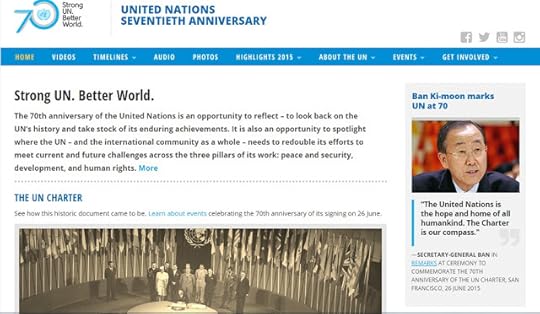
In spite of the flowery language - "A Strong UN, A Better World", "The UN Charter is our compass" - it would seem the UN no longer counts in world politics.
Why?
Two terrible mistakes were made at the birth of the United Nations (as I've already suggested in a previous post (see here):

Does the rise of civil society spell the end of the UN?
Over the past two decades, since the Earth Summit held in 1992 in Rio, thousands of NGOs have risen along with countless charitable organizations and even entirely new movements have sprung up like people's organizations and minorities. Take a look at UNPO that was constituted in 1994:
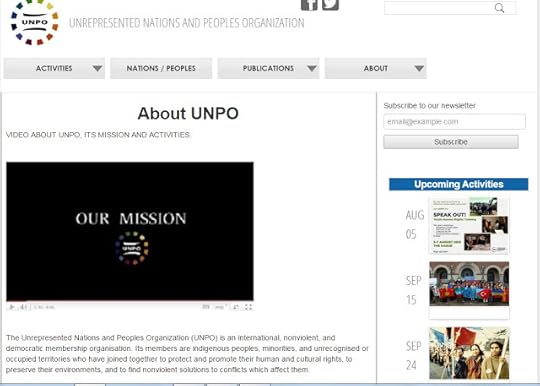
The question now arises: Is civil society strong enough to displace the UN and its member governments - is it changing the face of the UN?
Note here the beginning of an answer: UNPO, like so many similar entities, is organized with the aim of helping members to be "heard" at the UN (see their brochure and events organized at the UN, like this one last year).
More about that in my next post.
Source of photos: screenshots of websites.









In fact, the UN's 70th birthday that falls this year is celebrated with depressing discretion, yet the UN tries hard to work up enthusiasm on a dedicated website (here):

In spite of the flowery language - "A Strong UN, A Better World", "The UN Charter is our compass" - it would seem the UN no longer counts in world politics.
Why?
Two terrible mistakes were made at the birth of the United Nations (as I've already suggested in a previous post (see here):
1. Granting veto power at the UN Security Council to the winners of World War II: France, the UK, the US, Russia and China - this makes it impossible for the Security Council to function in a democratic manner, giving every member a right to vote;
2. Not setting up an independent "core army" for UN peace interventions: as a result, UN peacekeeping must necessarily depend on the "good will" of member nations, a good will that often turns into outright reticence and denial of the forces needed.But some things were done right:
1. An independent bureaucracy was set up and given a clear mandate to sustain the UN Charter and its values; hiring at operational levels (up to P-5, the highest of the five professional levels) is substantially free from political pressure;
2. UN technical agencies were established with clear missions and vision statements within the UN Charter and monitored by ECOSOC, the UN Economic and Social Council - and ECOSOC itself has been strengthened overtime; this has ensured continuity in the Organization's mandate and functions and, with the support of the UN staff who saw this as their duty, the continuing expansion of agency mandates and activities.Yet problems persisted:
1. UN higher management was subject to political pressure from the start: there was a game of political division that began as soon as the UN was created, with certain agencies reserved to particular countries, with the US getting the lion's share (e.g. control of the World Bank, the World Food Programme etc);
2. Member countries did not pay their dues or paid them late as a way to exercise political pressure or manifest discontent with the UN's action; historically, countries in arrears of payment are renegade countries that have tended to be poor and autocratic with one major exception, the United States, that has often wielded its power in this way, for example exiting UNESCO in 1984 in protest to its activities or delaying payments and diminishing contributions in a systematic way, year after year (e.g. at FAO starting in the late 1980s supporting so-called "zero-growth budgets" and pursuing this policy for decades; at WHO, making it impossible for that organization to maintain enough staff to monitor epidemics worldwide, and as a result, as we recently saw, WHO was late to call out on the Ebola emergency);
3. The scramble for extra-budgetary funds caused by problem (2) has weakened the independence of the UN and limited its range of action: many agencies have fallen prey to interest groups; civil society's presence at the UN has risen considerably and some, like the Bill and Melinda Gates Foundation wields a larger power, both economic and social, than many UN agencies.

Does the rise of civil society spell the end of the UN?
Over the past two decades, since the Earth Summit held in 1992 in Rio, thousands of NGOs have risen along with countless charitable organizations and even entirely new movements have sprung up like people's organizations and minorities. Take a look at UNPO that was constituted in 1994:

The question now arises: Is civil society strong enough to displace the UN and its member governments - is it changing the face of the UN?
Note here the beginning of an answer: UNPO, like so many similar entities, is organized with the aim of helping members to be "heard" at the UN (see their brochure and events organized at the UN, like this one last year).
More about that in my next post.
Source of photos: screenshots of websites.









Published on July 30, 2015 23:30
This is Why Aid Does Not Work
Africa has long been the litmus test: if aid succeeds in Africa, then we have a working model of what it takes to lift a country out of poverty and make an economy grow.
But aid in Africa, as researchers at the Brookings Institution recently pointed out, has failed in the past and is now failing miserably. Africa still has an extraordinarily large proportion of "working poor" - people who work hard and yet can't lift themselves out of the poverty trap. Industries exist in Africa, yet they don't expand, they don't attract workers and if they do, they pay them miserable wages.
Why?
Here are the reasons given by John Page in an excellent blog post about what President Obama missed in his African trip - I recommend you read it in its entirety (click here):
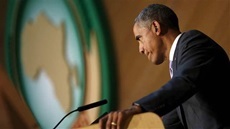 President Barack Obama delivers remarks
President Barack Obama delivers remarks
at the African Union in Addis Ababa, Ethiopia July 28, 2015.
And he closes his post, promising more on what can spur African growth and reflecting that
Yes, conventional wisdom has been around for too long. And cheerleading is a way to avoid the real issues.
Development can happen if, and only if:
1. Enough is done to develop the necessary public infrastructures: roads, bridges, ports, railways, warehouses etc etc
2. Enough is done to develop the needed skills and social services: education, technical training, health services etc etc
3. Enough is done to invest directly where most of the poor are, in rural areas. Laurent Thomas, FAO's Assistant Director General, upon returning from a major donor funding conference in Africa (Third International Conference on Financing for Development in Addis Ababa last week) makes a strong case for investing in agriculture: see his article on Impakter, here. A must read.
4. Enough is done to really open markets in the West for African goods: something is done, but not enough, it's more like a lip service to "free trade". Developed countries hide behind sophisticated customs barriers of all kinds and subsidize their own farming, making competition impossible for African farmers.
 Photo on Impakter:
Farming for the future (Tanzania) - Credits to ©FAO/Sara Quinn
Photo on Impakter:
Farming for the future (Tanzania) - Credits to ©FAO/Sara Quinn
We've known this for the past 70 years, ever since the United Nations was founded, as the world came out of World War II and everything had to be rebuilt.
It's not a magic recipe, it's not difficult to implement.
It just happens to be costly and people in the West are afraid to see the Third World poor come out of poverty - forgetting that trade between equally wealthy partners is really the best trade of all, the one that creates true and enduring wealth.
What do we want, true and enduring poverty?
To sum up: if aid does not work, it's because we're not doing the right things to make it work.









But aid in Africa, as researchers at the Brookings Institution recently pointed out, has failed in the past and is now failing miserably. Africa still has an extraordinarily large proportion of "working poor" - people who work hard and yet can't lift themselves out of the poverty trap. Industries exist in Africa, yet they don't expand, they don't attract workers and if they do, they pay them miserable wages.
Why?
Here are the reasons given by John Page in an excellent blog post about what President Obama missed in his African trip - I recommend you read it in its entirety (click here):
What President Obama didn’t see on his trip to Africa
 President Barack Obama delivers remarks
President Barack Obama delivers remarks at the African Union in Addis Ababa, Ethiopia July 28, 2015.
On his fourth trip to Africa, President Obama celebrated a changing continent. A change that he did not see, however, was growing numbers of workers in jobs that pay good wages and offer some employment security. In fact, except for a few high-tech entrepreneurs in Kenya and the staff of a U.S.-sponsored food supplement plant in Ethiopia it is unlikely he saw many Africans engaged in modern, high productivity jobs at all. That is because, despite nearly 20 years of solid GDP growth, Africa’s economies are creating too few jobs in the sectors that count: those with output per worker high enough to offer decent wages and a path out of poverty. More worrying still, the fastest growers are creating the fewest jobs (see Figure 1). Ethiopia and Kenya, the two countries on this visit, are among the region’s least successful countries in converting economic growth into employment growth. This is not how economic transformation is supposed to work.
Figure 1. Tilting the Wrong Way: Employment growth and growth in GDP in African countries (Average 2000-2011)But the main point he makes is this:
Source: Page and Shemeles (2015)
[It is a] sad fact that donors—the United States among them—have not been willing to address the more fundamental constraints to Africa’s industrial development: simple but costly things like infrastructure and skills or politically difficult things like expanding preferential market access. For example, slow implementation of Power Africa, lack of progress in improving educational quality, and the failure to extend the African Growth and Opportunity Act to most agricultural products were notably absent from the president’s published remarks.
And he closes his post, promising more on what can spur African growth and reflecting that
Africans, especially the young seeking good jobs, deserve something more from the U.S. president than cheerleading and conventional wisdom.
Yes, conventional wisdom has been around for too long. And cheerleading is a way to avoid the real issues.
Development can happen if, and only if:
1. Enough is done to develop the necessary public infrastructures: roads, bridges, ports, railways, warehouses etc etc
2. Enough is done to develop the needed skills and social services: education, technical training, health services etc etc
3. Enough is done to invest directly where most of the poor are, in rural areas. Laurent Thomas, FAO's Assistant Director General, upon returning from a major donor funding conference in Africa (Third International Conference on Financing for Development in Addis Ababa last week) makes a strong case for investing in agriculture: see his article on Impakter, here. A must read.
4. Enough is done to really open markets in the West for African goods: something is done, but not enough, it's more like a lip service to "free trade". Developed countries hide behind sophisticated customs barriers of all kinds and subsidize their own farming, making competition impossible for African farmers.
 Photo on Impakter:
Farming for the future (Tanzania) - Credits to ©FAO/Sara Quinn
Photo on Impakter:
Farming for the future (Tanzania) - Credits to ©FAO/Sara QuinnWe've known this for the past 70 years, ever since the United Nations was founded, as the world came out of World War II and everything had to be rebuilt.
It's not a magic recipe, it's not difficult to implement.
It just happens to be costly and people in the West are afraid to see the Third World poor come out of poverty - forgetting that trade between equally wealthy partners is really the best trade of all, the one that creates true and enduring wealth.
What do we want, true and enduring poverty?
To sum up: if aid does not work, it's because we're not doing the right things to make it work.









Published on July 30, 2015 01:42
July 29, 2015
Germany's Push Against the Euro
I'm reblogging this excellent post by Dr. Alf just out today, 29 July, drawing attention to an important article in the Financial Times.
In addition to Dr. Alf's very sound comments, I would just like to add:
if debtor nations leave the Euro, it means it's NO LONGER A VIABLE CURRENCY! The first countries to go would be France and Italy...
Of course, the country that will really suffer from Euro destabilization is Germany.
Will anyone tell them?
The article was illustrated with this image (I didn't dig it out, the FT and Dr. Alf did):
 German Chancellor Angela Merkel (C) smiles as 'council of economic experts' chairman Bert Ruerup (R) and Economy Minster Michael Glos (L) look on during a meeting at the Chancellery on March 12, 2007 in Berlin, Germany. Experts presented Chancellor Merkel a special detailed report during the meeting on how to help limit national debt
German Chancellor Angela Merkel (C) smiles as 'council of economic experts' chairman Bert Ruerup (R) and Economy Minster Michael Glos (L) look on during a meeting at the Chancellery on March 12, 2007 in Berlin, Germany. Experts presented Chancellor Merkel a special detailed report during the meeting on how to help limit national debt
(highlight added: the image dates to 2007, that's how old German policy on the Euro is!!)









In addition to Dr. Alf's very sound comments, I would just like to add:
if debtor nations leave the Euro, it means it's NO LONGER A VIABLE CURRENCY! The first countries to go would be France and Italy...
Of course, the country that will really suffer from Euro destabilization is Germany.
Will anyone tell them?
The article was illustrated with this image (I didn't dig it out, the FT and Dr. Alf did):
 German Chancellor Angela Merkel (C) smiles as 'council of economic experts' chairman Bert Ruerup (R) and Economy Minster Michael Glos (L) look on during a meeting at the Chancellery on March 12, 2007 in Berlin, Germany. Experts presented Chancellor Merkel a special detailed report during the meeting on how to help limit national debt
German Chancellor Angela Merkel (C) smiles as 'council of economic experts' chairman Bert Ruerup (R) and Economy Minster Michael Glos (L) look on during a meeting at the Chancellery on March 12, 2007 in Berlin, Germany. Experts presented Chancellor Merkel a special detailed report during the meeting on how to help limit national debt (highlight added: the image dates to 2007, that's how old German policy on the Euro is!!)
Let debtor nations leave euro, say German experts – FT.com
This is an important read from the FT, citing a report from Germany‘s Council of Economic Experts.via Let debtor nations leave euro, say German experts – FT.com.Whilst the FT’s article is a good read, it’s well worth reading the evidence from the German experts. You can rest assured that it is being avidly read by mainstream economists around the world.I read the executive summary from the German experts and many of the points are sound from a Germanic view of Europe. However, there are some fundamental weaknesses.
Firstly, every international mainstream economist has been arguing for years for Germany to reflate, create some controlled inflation, to give the rest of Europe some breathing room.
Secondly, the obsession with fiscal balancing ignores export imbalances (see Bernancke’s argument) – it also fails to address the economic case for top quality capital spending to stimulate the economic multiplier.
Thirdly, it fails to address the serious policy errors by both the IMF and the ECB – this was largely in response to political pressure from Germany.Thoughts?









Published on July 29, 2015 02:18
July 28, 2015
One Last Word about Greece and the Euro: Kaput?

Most economists consider the Euro a mistake, a non-viable currency. The proof that it is non-viable? It cannot face bad weather, as the Greek tragedy, started five years ago, has amply documented.
And now, drawing the lessons from the third, incredibly cruel bailout deal shaped by Germany's insistence on austerity, reforms and on Greece having to pay back its debt in full, it would seem that Grexit is more than ever on the table.
And not only Grexit. But also a Euro exit for France and Germany, as recently suggested by Shanin Vallée in an arresting New York Times Op-Ed commented by a Cyprus-based blogger, Dr. Alf (see here).
In short, we are talking now openly about the collapse of the Euro, something that was never done before.
Good-bye, Euro, nobody ever really wanted you in Europe. When it was conceived in the late 1990s, it was only meant as a way to force European countries to come closer together, a last step to oblige them to unite their economic and social policies, to create a single fiscal system and a common Treasury.
A pipe dream that Mr. Schaueble has kicked to pieces. Sixty years of Europe-building brought to naught. The German-French entente is dead.
Eurozone members refuse to consider themselves as part of a union with all that it entails: transfer of funds, helping your neighbour, compassion, collaboration. All values that have become meaningless to Europeans - and all because Germany won't hear of it. Germany is showing itself to be fundamentally anti-European. The only Europe it will tolerate is the one marching to the German tune: balance your budget, ya! And do it every year, or else.
This is an accountant's Europe.
And Dr. Alf asks hopefully:
"Will David Cameron be able to exploit to the UK’s advantage the emerging policy gaps between France and Germany?"I am quite certain that the UK could exploit the situation - but what situation are we talking about? Is David Cameron in fact a vulture happy to grab and tear apart a dead carcass?
Is a non-Europe to the UK's advantage?
Quite frankly, I believe all this is exaggerated.
There are several reasons I believe the Euro and the dream of a United Europe is not about to disappear:
1. Not all Germans agree with Merkel and Schaueble's stringent policies on Greece. Doubts about the "German model" are rising in Germany where public infrastructures are fast deteriorating and in urgent need of maintenance and repairs - something that cannot presently be done because of Merkel's insistence on balancing the budget;
2. The International Monetary Fund is pushing for a "sustainable debt" - that's jargon to say the debt must not weigh down on Greece's economy so that recovery becomes possible - implicitly, forms of debt relief and writing off are on the table.
3. The Greek bailout might work against all odds: Greece could implement the reforms demanded and find they help its economy rebound - but that scenario will work out only if:
the European Central Bank gives Greece monetary breathing space, i.e. maintains the Greek banking system functioning;the privatization of state assets - that infamous €50 billion fund demanded by Schaueble - is put on the back burner: in the current investment climate in Greece, it is impossible for the State to sell its assets and indeed so far, very little has been sold (less than €3 billion)So, I'm keeping my fingers crossed...Go on, Greece, don't listen to the Erynies who want to see you out of the Euro, you can make it!
But, Greece, my friend, you need to be serious about implementing those reforms, you need to show you mean business and regain the trust of your fellow Europeans...Walking around with this kind of poster doesn't help:
 Photo from TML Weekly
Photo from TML WeeklyWe need to leave this behind us. We need to return to a vision of a peaceful, harmonious and progressive Europe. The dream is still there, the promise is there, it is up to us, Greeks and other Europeans, to make it come true.









Published on July 28, 2015 03:42
July 21, 2015
Deutschland uber Europe: the End of a Dream?

The political fallout of the Greek crisis is hovering like a dark cloud over Europe. Germany - Deutschland - over all, over Europe. It marks the end of the European Dream.
Does anyone remember what that dream was?
For me, a United States of Europe is not the same thing as a United States of America. I never expected the same convergence: on the contrary, every European country's national identity - its History, its customs, its language - should be fully respected. And maintained within the Union. What I wanted was a convergence of a different order: a common foreign policy to promote European values and a common social policy (unemployment coverage, pension and health systems), giving the same benefits and same protection to every European citizen, no matter where he or she was born in the Union.
Most people don't see the European Dream in such big terms. Sure, they will refer to History, to the terrible two World Wars that shook the 20th century. And they will respond that a United Europe was supposed to put an end to all wars. Ok, I buy that, but it's a restrictive answer - a United Europe should have achieved much more than avoiding another war between France and Germany. It should have spread a respect for human rights worldwide. Now, the only organization left with that task is the United Nations. What a pity that the EU is about to miss its call to take its place in History!
On a more mundane level, most people, if asked what are the advantages of the EU in their lives, after grumbling about the useless bureaucracy in Brussels spewing out reams of ridiculous rules and regulations, will respond: traveling without having to go through customs or change money.
Yes, back to the Euro and the special role it was supposed to play.
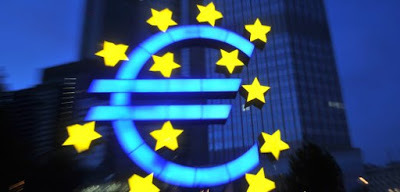
The Euro was supposed to be the tool for helping European countries mired in nationalism to take the final jump to federation, to a European Union not in name as it is now, but in fact. A real union where considerations of national sovereignty are set aside in favor of the common good.
The Euro - born with one leg, the monetary one (yes, there is a European Central Bank) - was supposed to "push" Eurozone partners into an ever closer union by forcing them to converge on adopting a common fiscal policy and creating a common European Treasury - the indispensable second leg of any currency worth its name.
We saw what happened instead (see my previous posts for the technical details - here I want to focus on the political aspects).
If Europe is dying today, Germany is to blame. And one German man in particular: Wolfgang Schaueble, the Finance minister.
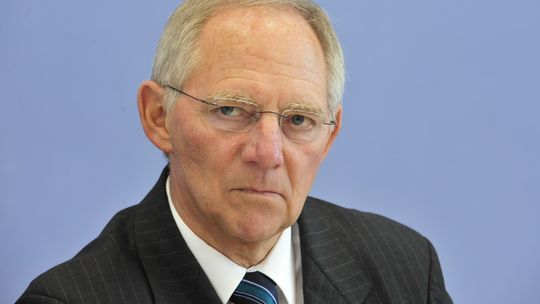
After having agreed with his partners, the finance ministers in the Eurogroup,to a proposal to continue negotiating on a Greek bailout, Mr. Schaueble appeared to go back on his word and has had the gall to suggest - and he did so several times, in particular before the German Parliament had to approve the bailout deal, presumably his attempt to sway it to give a negative vote - that Greece should consider exiting the Euro.
Who is he kidding? A Grexit would mark a watershed in European politics and he knows it. What is worse, is that the German Chancellor has covered her finance minister. Under normal circumstances, Ms. Merkel should either show the door to Mr. Schaueble or tell him very publicly to shut up. But she can't. She is a political animal and knows that Mr. Schaueble is more popular than she is, no doubt as a result of his strong stance on austerity and call for "Euro rules", i.e. his rules - squashing Greece like a bug.
But he is also squashing Europe like a bug. For the first time, Germany has shown its true nationalistic colors. And it has made clear that European integration is no longer in its national interest, it feels so strong that it can do without.
Here in Italy, people are growing concerned. They ask themselves, after Greece, why not Spain, Portugal, Italy?
One of the major Italian magazines, l'Espresso, had a very telling cover:

What the cover says (my translation):
Above Schaueble's picture:
"The Boss of Europe"
Underneath:
"This man is scary. He scares us too. The German super-minister of finance Wolfang Schaueble has imposed his law on the EU, humiliating Greece. And now Italy too fears his rigour."
And the article inside promises to tell us who this man really is.
I've mentioned before that I believe there is something odd in the unflinching support Angela Merkel gives to her finance minister. Particularly since he was tainted twenty years ago in the famous CDU (Christian Democratic Party) donations funding scandal.
And here I found the beginning of an answer.
If what L'Espresso says is right, Angela Merkel and Wolfgang Schaueble's relationship is steeped in murky waters.
Helmut Kohl, the German Chancellor at the time of German reunification, picked out Angela Merkel among young promising female politicians coming in from Eastern Germany, as the first East German representative in his government.
But Schaueble is the one who promoted her to CDU Secretary General.
Then, when the CDU funding scandal explodes in 1999, it is sweet Angela Merkel who revealed everything in a damning op-ed article accusing Kohl and published in the "Faz" (Frankfurter Allgemeine Zeitung, a major paper in Germany). That article was a ghastly back stab that killed off not only Kohl's career but also Schaueble's and marked the rise of Merkel's own career.
However something happens. When she became Chancellor in 2005, she offered the ministry of Interior and then of Finance to Schaueble.
Why? Maybe because ten years before, she had been made Secretary General of the party by Schaueble, the first stepping stone in her career. She is a woman who remembers her friends. Though, according to the Espresso, they are not such close friends. They did once go to the movies together but without Schaueble's wife. As to Kohl, he must have known where the music was coming from all along: at Schaueble's 70th birthday (he is 72 now), he didn't turn up while Angela Merkel did...
And Schaueble has recently become famous for fighting with Mario Draghi, the head of the European Central Bank. Nobody has ever fought with Draghi, he is the smooth, cool, composed central banker par excellence. Yet Schaueble managed to do the unthinkable, they both got so hot under the collar when discussing the Greek bailout, that Schaueble exclaimed "don't take me for a fool!" and the head of the Eurogroup had to suspend the meeting to let participants cool off.
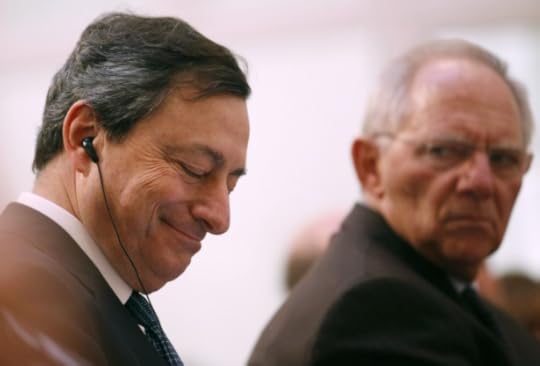 Draghi and Schaueble at the Eurogroup meeting that discussed the Greek Bailout (source of photo: here)
Draghi and Schaueble at the Eurogroup meeting that discussed the Greek Bailout (source of photo: here)The cause of the fight? It seems that Draghi was simply arguing that a Grexit would open the door to Russia and let it put a foot in the EU. In my view, not just Russia but China too. Whatever the exact cause of their squabble, you can see Schaueble at his best in the above photo: he really dislikes Draghi, if he could kill with his eyes, he would.
Draghi is surviving - his smile says as much - but can Europe survive?









Published on July 21, 2015 13:55
July 16, 2015
Three Reasons Why the "Deal" with Greece will Lead to a Euro Breakdown

To say that I've been "up all night" fretting about the Euro is an exaggeration, but I am deeply worried. This is the first time in recorded History that a currency is politically manipulated by 19 Parliaments, the way the Euro is. The awkward, blundering micro-management of the Euro by a bunch of politicians (led by the German finance minister Wolfgang Schaeuble who apparently understands nothing about either economics or monetary management) is deeply troubling.
In the early hours of Thursday 16 July, after much wrangling, the Greek Parliament approved the bailout deal - the passing of "reforms" against a "third bailout" on much stricter terms - sealing its fate: the Euro show (with attendant austerity) goes on. Now the European Central Bank must provide emergency funding to revive the banking system and keep the Greek economy tottering forward.
The Euro has already lost more than 9 percent against the dollar and stands to lose more as this Greek tragedy continues. And Grexit is still not off the table: once again Schaeuble aired the view that a temporary Greek exit from the 19-nation euro region may be “the better way” since it would allow for the debt forgiveness that is presently banned under "Euro rules", i.e. the rules as he understands them (see Bloomberg here). The general idea is that Greece is tiny, just 2 percent of total eurozone gross domestic product, and that its fate, whether in or out, can't affect the Euro.
So the Euro is saved for now. But given that premise, where is the Euro, that totally novel, politically mismanaged currency, headed over the long run?

Three reasons why the "bailout deal" with Greece will inevitably lead to the breakdown of the Euro, marking the end of the European project of a United States of Europe:
1. Greece's creditors, Germany foremost, do not recognize that a currency union is necessarily a transfer union: the Euro can survive only if it is managed like the US dollar, with a Central Bank and a Treasury ensuring the fiscal transfers needed for currency stability. In the US, in 2014, 28 American states sent the equivalent of 2.3 percent of their gross domestic product through the US federal budget to 22 other states of the Union, the biggest donor was Delaware (21 percent of its GDP) and the biggest recipient was North Dakota (90 percent). In the Eurozone, by comparison, Germany, the biggest donor, sent 0.2 of its GDP through the EU budget and Greece received 0.2 percent: that's ten times less, a pittance. The data is for 2011 but it's about the same each year, there's no flexibility, no built-in adjustment in the EU system. By contrast, every April, the banks in the Federal Reserve system smooth out regional imbalances in the system, re-allocating every asset and writing off what cannot be recovered - to recognize losses and write them off is not daring or risky, it's merely sound financial management.
2. Germany's unrelenting insistence on fiscal sovereignty and "Euro rules": this has prevented the establishment of mechanisms needed to bring flexibility and resilience to the Euro. Now it is Greece that is facing default, but in future a recession and a wave of bad loans could hit any country in the Eurozone, for example, a big economy like Italy's, and there is nothing to stabilize the system: the European Stability Mechanism is minuscule (it could not handle an Italian disaster), it is limited in use and ultimately dependent for its functioning - as we now see with the Greek bailout saga - on the goodwill of European Parliaments, in particular Germany's.
The necessary mechanisms are at least three:
a pooled-unemployment schemea sytem-wide scheme of bank-deposit insurancecollectively guaranteed Euro-bondsNumber (3) is essential in the absence of a common European Treasury.
Collectively guaranteed Euro-bonds have been proposed as soon as the Greek sovereign debt crisis broke out and Germany has never accepted the proposal. Yet it is the only proposal that could save the Euro in the short term. Squeezing an economy the way Greece is being squeezed solves nothing: as you slap on taxes and cut back on State expenditures, you necessarily reduce overall demand in the economy. This makes it impossible to achieve the kind of income that allows for tax revenues to rise, making it possible to re-pay the debt.
Euro-bonds would solve the debt problem immediately while allowing the Greek economy to recover - and in a recovering economy, it becomes politically feasible to take all the needed measures to reform pensions, rationalize the Greek bureaucracy and remove other excesses. In the current political atmosphere in Greece, additional austerity measures as called for by Germany are irrealistic, irresponsible and morally reprehensible. And not likely to be implemented. But Germany won't hear of Euro-bonds...Anyone in Germany reading me? Please, spread the word...
3. The idea that the Euro is an indissoluble monetary union is now dead - yet that had been the only feature that kept the Euro alive without putting in place the necessary mechanisms described above: (1) a common European Treasury and (2) unemployment schemes, bank-deposit insurance and Euro-bonds.
The idea is growing that the Eurozone should be made of like-minded, economically equal partners, i.e. Northern Europe by itself, leaving out the "profligate, lazy" South - you start with kicking out Greece and next Portugal, Spain, Ireland, Italy and yes, France too, why not? It's often talked of as the "sick man of Europe", who needs France in the Euro?
And you do all this in an "orderly manner". So, no problem, right?
Wrong.
This is a dangerous idea, it spells the breakdown of the famous French-German partnership in Europe.
But the real problem with this idea is that it makes economic sense. Since Germany cannot let go of fiscal sovereignty, a Euro limited to Germany and a few like-minded Northern European countries is the only kind of Euro that could reasonably survive in the long run as a stable, functioning currency.
If this is the outcome of repeated bailouts for Greece and/or an eventual Grexit, tell me what's left of the European Project? The Euro was supposed to be a tool to push the Union and force the countries of Europe to come together.
So far, the Euro has failed miserably in this task and the European ethics of all-for-one and one-for-all are dead and buried...
Source of photos: screenshots taken from Reuters video "Greeks fear cost of new deal" (here)
The data for the above analysis is taken from the following excellent articles that I highly recommend you read if you have time:
Eric Beinhocker on Bloomberg Views "Europe's Insane Deal with Greece":
Clive Crook on BV: "Europe Owns this Disaster":
Christian Odendahl, John Springford on Centre for European Reform: "The Greek bailout deal resolves nothing"
The authors:
Eric Beinhocker is Executive Director, Institute for New Economic Thinking at the Oxford Martin School, University of Oxford, author of The Origin of Wealth
Clive Crook is a Bloomberg View columnist and a member of the Bloomberg View editorial board. A former chief Washington commentator of the Financial Times, he previously worked at the Economist and as a senior editor at the Atlantic.
Christian Odendahl is chief economist at the Centre for European Reform. Christian works on European macroeconomics and growth; the eurozone, its institutions and political economy, monetary and fiscal policy; as well as German politics and economics.
John Springford is a senior research fellow, working on economic issues, at the Centre for European Reform in London. He acted as secretary to the CER’s commission on the economic consequences of leaving the EU, which published its final report in June 2014.









Published on July 16, 2015 03:18
July 14, 2015
Greek Bailout: 4 Reasons Why it's Not a Done Deal
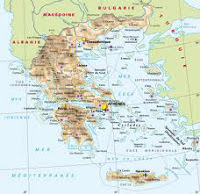 In my previous post I spoke of Germany's intransigence towards Greece, now we are seeing the fallout of that rigid position:
In my previous post I spoke of Germany's intransigence towards Greece, now we are seeing the fallout of that rigid position:1. If the Greek Parliament doesn't pass the legislation the creditors have asked for by tomorrow, Wednesday July 15, Greece is out the Euro door, it's Grexit.
This legislation - regarding pension reform, tax hikes, sale of state assets etc, in short, the whole austerity package - is nothing new. The language is all there, finalized in law proposals. The creditors, through the so-called "troika" negotiators (representatives from the EU, the European Central Bank and the IMF), have been asking for this legislation since 2011.
But no Greek government before Tsipras has dared pass it.
Can he do it?
He has a BIG problem: he must submit a bill with sales-tax increases and pension cuts that go against his own party's pledges. He looks like he betrayed the 61% of Greeks who voted "no" to the referendum he called for when he walked out on the bailout negotiations.
Reports are that he has already lost votes and that the bill may pass - if it passes - with outsider support, causing him to either reshuffle his government, keep on as a minority government or even go to new elections by year-end or sooner.
2. If the Greek Parliament passes the legislation, approval has still to be obtained from 6 other Euro countries before bailout negotiations can resume. The German Parliament is reportedly set to vote on Friday. Thus time will necessarily pass before bailout negotiations can restart. And reports are that this time they would focus on a bigger new loan: as much as €86 billion ($94 billion) and with some (unconfirmed) rumors of debt restructuring as it is become clear to more people that the Greeks can never repay back the full debt.
3. Bridge financing: this is inevitable since Greece has several deadlines to meet on its debt, and has already failed to meet twice with respect to the IMF. By next Monday, it owes a total of €7 billion. The Eurogroup is currently discussing this.
4. Greek banks continue to be closed. Capital controls are in place. Insolvency is near, the European Central Bank is keeping Greek banks on life support, but it hasn't added any funding and won't do so until it sees the result of the vote in the Greek Parliament on Wednesday.
The problem with the Greek banks goes deeper: a good third of their loans have gone bad and they hold Greek debt bonds whose value keeps dropping. There is talk of restructuring and the expectation that the main four banks could be reduced to three or two.
To remedy this, Germany has proposed a €50 billion "Greek Asset Fund" to be constituted with publicly-owned assets - for example, from selling the unused gigantic airport near Athens constructed for the Olympics. Half of that sum, €25bn would be used to fund the cash-starved banking system, a quarter would go to investment within Greece to help support economic growth and the rest to help pay down debt. And all this would be monitored by outsiders, probably the IMF.
This is wishful thinking.
Talk of selling state assets began in 2010, so far only the best assets have been sold, most likely to government cronies, and for a total under €4 billion. Nobody is coming forward to buy the unused Athens airport or the Greek postal system - not to mention that much prized state-owned land on coasts has been built over by private citizens illegally occupying the soil. How quickly can the government free such lands to sell them?
In short, privatization is a dead-end road. The Greek economy, slapped with higher taxes, will immediately sink further. The debt will grow larger and ever more difficult to pay.
Why not restructure the debt? Why is Germany so hard on Greece?
Because it needs to make an example of Greece for the rest of Europe. It needs to make clear the rules of the game to other members flirting with unsustainable debt in the Eurozone: you make the mistake, you pay for it. Spain, Portugal, Ireland, Italy, you are warned.
And what if there was some hidden agenda in the German game? After all, it's a well known fact that its own landesbanks are in deep financial trouble, and, as Ambrose Evans-Pritchard recently wrote in the Daily Telegraph, "the German model is ruinous for Germany and deadly for Europe" (see here). He argues very convincingly that Germany's fixation with balancing the budget has already caused untold pain and the collapse (or threatened collapse) of major public infrastructure (waterways, ports etc). As he put it: "France may look like the sick of man of Europe, but Germany’s woes run deeper, rooted in mercantilist dogma, the glorification of saving for its own sake, and the corrosive psychology of ageing...It cannot continue to live off exports of capital goods to China and the BRICS as they hit the buffers, or by stealing a march on southern Europe through wage compression, a zero-sum game."
And we all know that these days, China is facing big problems of its own, with the collapse of its stock market.
Suppose Germany's own banking system wasn't quite as solid as it looks, that could very well be why it can't take either a Grexit or a slashing of the Greek debt and it prefers to muddle through.
Because that is exactly what we are seeing now: a messy, muddling through of the Greek debt that could last years - this is already the third bailout. Do we want a 4th and a 5th?
How long will it take to make Germany understand that a debt "haircut" is inevitable?
Or is "muddling through" the Merkel governing style of choice?
If you're curious to know what Varoufakis thinks of this "bailout deal", read here. He is the Minister of Finance ousted by Tsipras following the referendum, presumably as a move to ingratiate himself with European leaders who couldn't stand his outspoken manner. Indeed. He sees the recent Eurosummit as "nothing short of the culmination of a coup."
Yes, the Greeks are understandably very angry. And hurt.
Related articles
I recommend this article from Reuters just in (click here) with breaking news of a secret IMF study showing that Greece would need far more debt relief than European leaders are willing to consider - it ends on a striking image of a man walking by a mural in Athens (photo by Yannis Behrakis):

Other articles:
[image error] What's next for Greece? Timeline of the remaining obstacles [image error] Greece Agreement: What Exactly Is The Deal? [image error] Greece aims to end bank holiday Thursday: report









Published on July 14, 2015 15:49
July 12, 2015
Shame on You, Germany, You are Killing the European Project
Today is D-day for the Euro. It looks like a technical matter but it isn't.
It has to do with the European project, the dream of having a United States of Europe.
This afternoon, the leaders of Europe are meeting in Brussels, at 4 pm, to decide whether Greece must exit the Euro or can stay in.
According to Bloomberg (here), European leaders will have to decide because their finance ministers can't: the German Finance Minister, Mr. Wolfgand Schaeuble, has successfully blocked any decision, screaming "Don't take me for a fool", refering to the Greek proposals.
The real fool is him.
Or perhaps, not so foolish but extremely wily.
Like a fox.
Think of it, years ago, he was involved in a corruption scandal in Germany - also known as the CDU donation scandal, it exploded twenty years ago - and his career looked finished (for details, see here).
Until he was saved by Ms. Merkel who gave him a "second life" - and now he is showing his true colors, he is strangling the European project.

Can anyone tell me what really links Ms. Merkel, a German Chancellor who surprisingly doesn't want to or doesn't dare defend Europe, to her finance minister?
And why does Germany hate Europe so much? What's wrong? What happened to the values of solidarity and cooperation?
Ethics used to be a German preoccupation, it appears to no longer be the case.
I don't have a crystal ball, so I don't know how all this will end. But I do know one thing and I wanted to share it with you: For me, this is the saddest day in the History of Europe.
A beautiful dream of peace and love and justice is dying.









It has to do with the European project, the dream of having a United States of Europe.
This afternoon, the leaders of Europe are meeting in Brussels, at 4 pm, to decide whether Greece must exit the Euro or can stay in.
According to Bloomberg (here), European leaders will have to decide because their finance ministers can't: the German Finance Minister, Mr. Wolfgand Schaeuble, has successfully blocked any decision, screaming "Don't take me for a fool", refering to the Greek proposals.
The real fool is him.
Or perhaps, not so foolish but extremely wily.
Like a fox.
Think of it, years ago, he was involved in a corruption scandal in Germany - also known as the CDU donation scandal, it exploded twenty years ago - and his career looked finished (for details, see here).
Until he was saved by Ms. Merkel who gave him a "second life" - and now he is showing his true colors, he is strangling the European project.

Can anyone tell me what really links Ms. Merkel, a German Chancellor who surprisingly doesn't want to or doesn't dare defend Europe, to her finance minister?
And why does Germany hate Europe so much? What's wrong? What happened to the values of solidarity and cooperation?
Ethics used to be a German preoccupation, it appears to no longer be the case.
I don't have a crystal ball, so I don't know how all this will end. But I do know one thing and I wanted to share it with you: For me, this is the saddest day in the History of Europe.
A beautiful dream of peace and love and justice is dying.









Published on July 12, 2015 02:15

